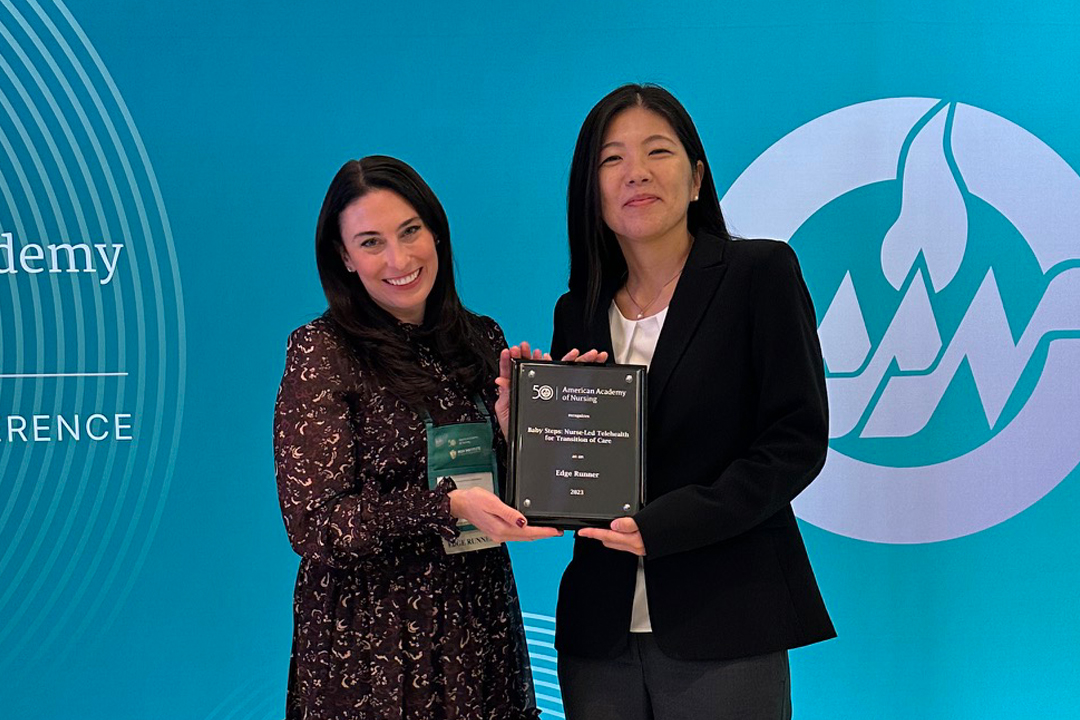The American Academy of Nursing has selected four innovative nurse-designed models for recognition at the 2023 Health Policy Conference. One of these Edge Runners has been awarded to "Baby Steps: Nurse-led Telehealth for Transition of Care", the program led by Danielle Sarik, Ph.D., APRN, CPNP-PC, a 2022-2023 Fellow in Health Policy and Media.
Could you share your initial reaction when you found out you were being recognized by AAN as an Edge Runner?
When I first received the email informing me that the Baby Steps Model had been selected as an Edge Runner I was ecstatic, and honestly, a bit surprised! One of my mentors through the GW Health Policy and Media Fellowship (Barbara Glickstein) had encouraged me to apply, and without her prompt I am not sure that I would have pursued the application.
What does this award mean to you personally and professionally?
Personally, this recognition is immensely gratifying. I’ve been working closely with my team for the last four years to apply for funding, develop the program, implement the model, and evaluate our results – this recognition makes me feel as if that dedication and work has potential to not only change care for our patients and families, but is externally recognized as a potential nurse-led model of care that can be scaled and spread to other health systems.
Professionally, this award is a wonderful opportunity for visibility of this work and model. I’ve already had the chance to meet new potential partners and have key conversations about moving the work forward that wouldn’t have happened without the Academy’s recognition of Baby Steps as an Edge Runner.
Can you tell us more about the work or projects that led to this recognition?
The health care system identified a gap in support for patients discharged from the neonatal intensive care unit (NICU) and their caregivers during the transition from hospital to home care. Challenges during this acute transition period often led to readmission and increased care in the post-discharge period. To properly facilitate an optimal transition to home for patients and caregivers in this critical time, we conceptualized the Baby Steps model, which connects the hospital system to the home for infants who receive NICU services, as well as their caregivers. After studying the South Florida pediatric hospital, Nicklaus Children’s Hospital, we conceptualized the Baby Steps model to serve those who face cultural and socioeconomic barriers in receiving equitable, quality, and stable access to medical health services. With the development of culturally appropriate and language concordant care, the Baby Step model aims to remove barriers to receiving care and provide support via a comprehensive, nurse-led approach after discharge.
How do you see this award impacting your future work in the nursing field?
Receiving the Edge Runner award has been a huge source of encouragement for me, and an inspiration to keep going. We know that nurses are well positioned to provide culturally informed and equitable transition of care support, and I plan to continue pursuing this area of research and practice. We have such a huge gap between our in-patient or acute care settings and the communities our patients return to, and it is our responsibility to address this challenge in order to provide the best possible care.
While individual programs are a positive start, we need system-level and policy changes to ensure that equitable transition of care services and programs are available to all of our vulnerable patients, especially those who may have access barriers at baseline. As our understanding of social determinants of health evolve, it is critical that nurses partner with patients and families to identify where changes are needed and how we can leverage the unique skills of nurses to address transition of care concerns.
Were there any mentors or colleagues who played a significant role in your journey to this award?
I would like to acknowledge and thank GW, and in particular, the Health Policy and Media Fellowship, for their support of my advocacy and media work in this area. Due to the support and training that I received, I have been able to vocally advocate for Baby Steps through podcasts, social media, and print media. Barbara Glickstein, one of my mentors through the program, was instrumental in supporting me to apply. Additionally, without my colleagues at Nicklaus Children’s Hospital and my co-primary investigator at University of Miami School of Nursing and Health Studies (Dr. Yui Matsuda), this work would not be possible.


